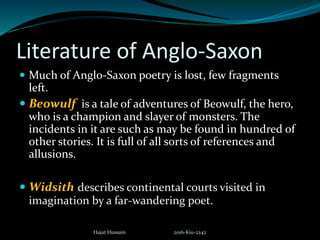Anglo Saxons Period or Old English
- 3. Karakoram International University Gilgit ï Prepared by Hajat Hussain ï Reg No. 2016-KIU-2242 Hajat Hussain 2016-Kiu-2242
- 4. List of Topics ïBackground of Anglo-Saxon ïCharacteristics of Anglo-Saxon ï5 principles of Anglo-Saxon ïLiterature of Anglo-Saxon ïFamous Poets ïDevelopment of Prose ïEnding of Anglo-Saxon Period Hajat Hussain 2016-Kiu-2242
- 5. Background of Anglo-Saxon ï English Literature started with Anglo-Saxon literature. English was common tongue of Angles and Saxons before occupied Britain. ï Before they occupied Britain they lived along the coasts of Sweden and Denmark, and the occupied land was called Engle-land(England). Hajat Hussain 2016-Kiu-2242
- 6. Characteristics of Anglo-Saxon ï These tribes were fearless, adventurous and brave. ï They sang at their feast about battles, gods and their ancestral heroes and some of their chiefs were bards (poets). ï Their Songs was about religion, wars and agriculture and English poetry began from these songs. Hajat Hussain 2016-Kiu-2242
- 7. 5 principles of Anglo-Saxon ï They followed five principles in their life. 1. Love to personal freedom 2. Responsiveness to nature 3. Love for religion 4. Love for womanhood 5. Struggle for glory Hajat Hussain 2016-Kiu-2242
- 8. Literature of Anglo-Saxon ï Much of Anglo-Saxon poetry is lost, few fragments left. ï Beowulf is a tale of adventures of Beowulf, the hero, who is a champion and slayer of monsters. The incidents in it are such as may be found in hundred of other stories. It is full of all sorts of references and allusions. ï Widsith describes continental courts visited in imagination by a far-wandering poet. Hajat Hussain 2016-Kiu-2242
- 9. ContâĶ ï Walhere tells how Walter of Aquitaine withstood a host of foes in the passes of the Vosges. ï The Fight at Finnesburg deals with the same favorite theme of battle against fearful odds. ï Complaint of Doer describe the disappointment of a lover. Hajat Hussain 2016-Kiu-2242
- 10. ContâĶ. ï After the Anglo-Saxon embraced Christianity, the poets took up religious themes as the subject matter of their poetry. ï Major Portion of Anglo-Saxon poetry is religious. Hajat Hussain 2016-Kiu-2242
- 11. Famous Poets ï The two important religious poets were Caedmon and Cynewulf. ï Caedmon sang in series the whole story of fate of man, from the Creation and the Fall to the Redemption and the Last Judgment. ï Cynewulf his important poem is Crist, a metrical narrative of leading events a Christâs ministry upon earth, including his return to judgment. Hajat Hussain 2016-Kiu-2242
- 12. Development of Prose ï This period was also marked by the beginning of English Prose. ï King Alfred translated Latin to English through which a prose was established. ï There was no break in prose of Anglo-Saxon Period. ï The great success of Anglo-Saxon prose is in religious events. Hajat Hussain 2016-Kiu-2242
- 13. ContâĶ. ï The two great pioneers of English prose were King Alfred and Priest Aelfric. ï Alfred the Great, the glorious king of Wessex, who translate a number of Latin Chronicles( Historical books) in English. ï Aelfric a priest, who wrote sermons in a sort of poetic prose. Hajat Hussain 2016-Kiu-2242
- 14. Ending of Anglo-Saxon Period ï The Anglo-Saxon period was ended in 1066 A.D, when last king of Saxon Harold defeated by William the Conqueror of Normandy at the battle of Hastings. ï The Anglo-Saxon period in English literature extends from 670 A.D to 1100 A.D. ï The new period was Anglo-Norman Period or Middle English (1100 to 1500). Hajat Hussain 2016-Kiu-2242
- 15. ReferencesâĶ. ï A Critical History of English Literature by B.R Mullik ï History of English Literature By David Daiches Hajat Hussain 2016-Kiu-2242
















